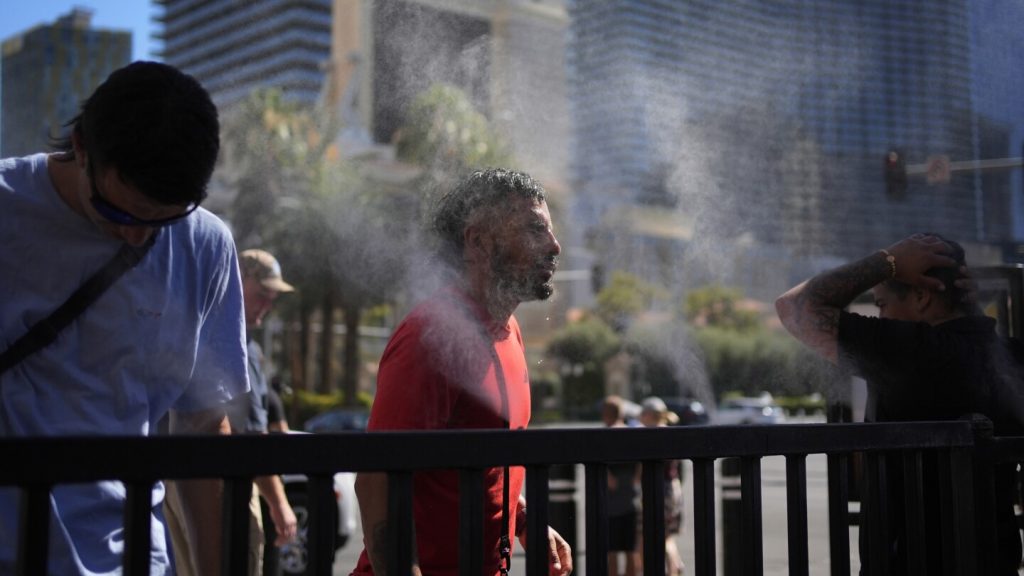NEW YORK (AP) — As the cost of electricity outpaces inflation and summers grow deadlier, consumer advocates are sounding alarms about the risks to low-income people who can’t afford consistent air conditioning in dangerous temperatures.
While about half of U.S. states offer protections from utility shutoffs during extreme heat, the rest do not. In contrast, 41 states have “cold weather rules,” which forbid utility companies from shutting off household heat during extreme cold. The Low Income Home Energy Assistance Program (LIHEAP) provides funds for vulnerable groups who have trouble affording heating bills in the winter, but the program has less funding available to meet consumers’ increasing needs in the summer months.
Shylee Johnson, 27, based in Wichita, Kansas, saw firsthand the protection that the local Low Income Energy Assistance Program (LIEAP) brought to her community during the three years she worked as a case manager for families who were behind on utility bills.
“It was amazing at keeping people’s electricity on in the winter,” she said of the program, which subsidizes costs for households who can’t afford utility expenses. “Families would be deciding between paying their heating bill or another bill, and this took that decision away.”
In the summer, though, Johnson said she’s seen how late or missed utility payments can result in the shutoff of electricity and the removal of vital services, despite air conditioning becoming increasingly essential to families’ health and well-being.
“It’s terrifying,” she said. “There’s a ‘cold weather rule’ — in freezing temperatures, your heat can’t be turned off. But there isn’t an equivalent for summer in Kansas.”
The clients Johnson served were often the most vulnerable, including families with young children, pregnant people, and those with sick or disabled family members, including some who need electricity to operate essential medical equipment in their homes. LIHEAP also sometimes provides air conditioning units in the summer for households that can’t afford to purchase their own units.
Recent studies show that extreme heat in the summer is now the leading cause of weather-related deaths, according to the U.S. Environmental Protection Agency (EPA). That’s ahead of deaths due to extreme cold in the winter or other weather emergencies, like hurricanes or tornadoes. The frequency, duration and intensity of extreme heat waves has significantly increased over the past several decades, according to the EPA, and insignificant support for low-income households contributes to the danger.
In 2023, the death certificates of more than 2,300 people who died in the summer mention the effects of excessive heat, the highest number in 45 years of records, according to an Associated Press analysis of Centers for Disease Control and Prevention data. And that figure is only a fraction of the real death toll, according to coroner, hospital, and ambulance records, also analyzed by the AP.
Nationally, the cost of electricity has risen at twice the pace of the average cost of living, exacerbating the problem.
According to the National Energy Assistance Directors Association (NEADA), which represents state program managers of LIHEAP, almost 20% of very low-income families lack consistent access to cooling. Currently, 26 states and the District of Columbia offer assistance with summer energy bills, while 21 states plus D.C. have policies protecting low-income families from utility disconnections during summer months.
Still, roughly 85% of LIHEAP resources are used for heating in the winter, leaving little support for households seeking cooling, according to Mark Wolfe, executive director of NEADA.
“Rules that were written thirty years ago, that were adequate for winter, are not adequate for the summer,” he said. “How do we protect vulnerable households both during periods of extreme heat and extreme cold? The rules haven’t caught up.”
Karen Lusson, senior attorney at the National Consumer Law Center who focuses on energy and utility affordability, said that many deaths from extreme heat in the summer months are preventable.
“The impression we’ve all had is that weather is most dangerous in the wintertime,” she said. “Not any more.”
While the Trump administration fired the entire staff of the LIHEAP program in April, Wolfe and Lusson are hopeful Congress will approve slightly more funding for the program in the fall compared to the previous fiscal year, they said.
To protect households during increasingly hotter summers, Lusson recommends individuals seek information about their rights when it comes to utility shutoffs. State utility commissions, which regulate public utilities, dictate local rules. To find your relevant commission, consult the government site operated by the national association of regulatory commissions, which has a state-by-state look-up tool.
Lusson also encourages people to look into whether their state protections are calendar- or temperature-based, which can make a difference in planning. While some states forbid shut-offs during certain months of the year, others base the protections on the temperature of a given day or the presence of a heat advisory. This LIHEAP site has a break-down of every state’s policies.
Some state attorney generals’ offices also have public utility bureaus that advocate on behalf of consumers, Lusson said.
Lastly, it can be helpful to determine if your utility company offers discount rates or percentage-of-income payment plans to help with electricity bills. Both commission and utility websites have specific information about how to access LIHEAP assistance and whether or not the utility company itself offers assistance.
___
The Associated Press receives support from Charles Schwab Foundation for educational and explanatory reporting to improve financial literacy. The independent foundation is separate from Charles Schwab and Co. Inc. The AP is solely responsible for its journalism.

